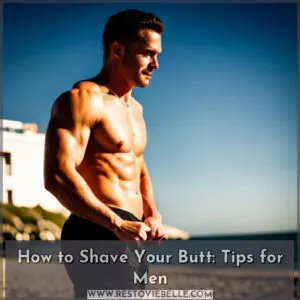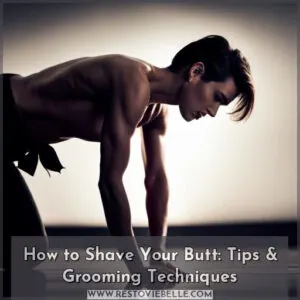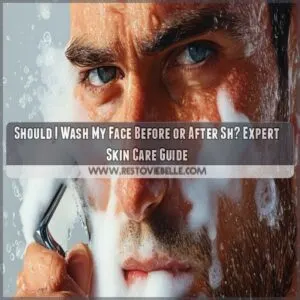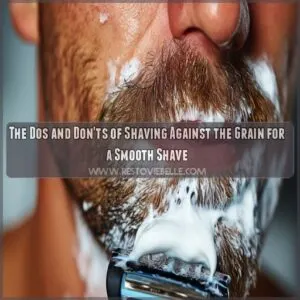This site is supported by our readers. We may earn a commission, at no cost to you, if you purchase through links.
 Master the timeless ritual of shaving. The safety razor should demonstrate both precision and control for a close shave, unlike what one can enjoy with disposables.
Master the timeless ritual of shaving. The safety razor should demonstrate both precision and control for a close shave, unlike what one can enjoy with disposables.
This how-to guide will walk each interested individual through steps detailing razor mechanics and techniques to have that smooth, clean shave every time.
Learn how to prepare, shave with the grain, maintain your razor, and keep it running optimally.
Bring your shaving up a notch or two with this detailed and professional approach to the perfect shave
Table Of Contents
- Key Takeaways
- How to Shave With a Safety Razor?
- Understanding Safety Razors
- Preparation for Shaving
- Shaving With the Grain
- Safety Precautions
- Efficiency and Maintenance
- Choosing the Right Safety Razor
- Post-Shave Care
- Frequently Asked Questions (FAQs)
- Is it harder to shave with safety razor?
- Do you shave up or down with safety razor?
- How to use a safety razor for beginners?
- Do you need to wet shave with a safety razor?
- How do you shave with a safety razor?
- What should you know about shaving with a safety razor?
- Should you use a safety razor?
- What is a safety razor?
- How often should safety razor blades be replaced?
- Can safety razors be used for head shaving?
- Whats the difference between open and closed comb heads?
- Are safety razors suitable for women?
- How should I dispose of used blades?
- Conclusion
Key Takeaways
- Master the angle and you’ll be smooth sailing: Hold that razor at a cool 30 degrees and let its weight do the heavy lifting. No need to channel your inner lumberjack – a gentle touch is all it takes for baby-smooth skin.
- Prep like a pro, shave like a champ: Warm water and a quality lather are your best friends here. Think of it as pampering your face before the main event. Your skin will thank you, and you’ll be strutting out of the bathroom feeling like a million bucks.
- Short strokes are the secret sauce: Keep those strokes short and sweet, about 1-3 cm. It’s not a race, folks! Take your time and treat each patch of stubble like it’s the VIP of your face. Your reward? A nick-free, irritation-free shaving experience that’ll make you wonder why you ever bothered with those disposable razors.
- Post-shave TLC is where the magic happens: Cap off your shaving adventure with a splash of cold water (brrr!) and some soothing balm. It’s like giving your face a mini spa day. Trust me, your skin will be so happy, it’ll practically be humming "Smooth Operator" for the rest of the day
How to Shave With a Safety Razor?
To shave with a safety razor, start by understanding your hair growth direction. Apply shaving cream and hold the razor at a 30° angle.
Use short, controlled strokes of 1-3 cm, letting the razor’s weight do the work. Shave with the grain to minimize irritation. Flip the razor as it clogs and rinse frequently.
For a closer shave, re-lather and make a second pass. Finish with an aftershave balm to soothe your skin.
There’s more to mastering this art than meets the eye
Understanding Safety Razors
Knowing the ins and outs of safety razors does make a world of difference when it comes to shaving. With an inherent allowance of safety and very minimal exposure to a blade, a double-edge safety razor is quite friendly for beginners.
The handle is weighted, making it controlled yet effortless just to let the razor’s weight do its job. Further, one-piece or three-piece razors customize usage according to preference. Double-sided blades reduce the frequency of rinsing and allow efficient use of the blade.
More importantly, a new set of blades gives you a sharp shave that will have no drag on the skin. Mastering the safety razor empowers you with a smoother and closer shave, giving you more economical and eco-friendly grooming options
Preparation for Shaving
It’s essential, before you start, to know the direction in which your hair grows and use plenty of shaving cream or soap. Always apply the razor at an angle of 30 degrees; do this via short, controlled strokes of between 1–3 cm, allowing the razor to do the work for a perfect shave.
Understand Hair Growth Direction
Knowing the direction of hair growth is essential for shaving smoothly. Conduct a hair growth assessment using the following steps:
- Observe the growth patterns of hair.
- Grain direction mapped for each section of the beard.
- Always shave with the grain first.
- Shaving against the grain—save this one for last.
These steps ensure a smoother and less-irritative time during shaving.
Apply Shaving Cream or Soap
Start with a small amount of shaving cream or shaving soap in your shaving bowl or scuttle. Add a few drops of warm water and use your brush to create a rich lather. Apply the lather evenly across your face, ensuring a smooth, even layer that lifts the hair for an efficient shave. Be thorough in your lather preparation
Hold Razor at 30° Angle
Now that you have applied the shaving cream or soap, it’s essential to hold the safety razor at a 30° angle to have sharper blades and less irritation to the skin. Just be sure your wrist position is always constant and comfy while gripping the handle.
- Tilt the head of the razor to the side and correct the angle.
- Begin wet-shaving, maintaining correct blade orientation.
- Avoid pressing too hard
Use short strokes of 1-3cm
Use tiny strokes between 1 and 3 cm to ensure the razor doesn’t get clogged and that the angle is maintained correctly. A sharp blade, taut skin, and the ease of gliding should go without saying. These methods of shaving with a safety razor will provide a most comfortable and close shave with a significant decrease in nicks and cuts. The optimal element is, of course, control, which this brings.
| Aspect | Importance | Benefit |
|---|---|---|
| Short Strokes | prevents razor clogs, provides an even performance |
Sharp Blade- Smooth Glide, Less Irritation
Let Razor Do the Work
Let the weight of the razor slide along your skin, in it. With every short 1-3 cm stroke, let the weight of the razor slide over your skin.
- Use no pressure; the weight of the razor should shave efficiently.
Smooth Strokes benefit in preventing clogs and maintaining a clean and healthy shave.
- Shave With The Grain For A Comfortable And Irritation-Free Experience.
Shaving With the Grain
Shave in the direction of hair growth to minimize irritation and achieve a smoother result. As the razor clogs, flip it over and rinse it clean to maintain effectiveness and prevent tugging
Shave in Direction of Hair Growth
When you start to shave, always shave in the direction of the grain. Use a 30° razor angle to stroke smoothly, as this will significantly avoid skin irritation and dryness. Always exert soft pressure with the razor to avoid cuts, especially for people with rough hair or whose hair causes ingrown hairs. Use shaving cream for a lubricated, clean sweep.
Flip Razor Over as It Clogs
As you shave in the direction of hair growth, you’ll notice razor clogging from the shaving cream and stubble. To maintain efficiency and minimize skin irritation:
- Flip the razor over.
- Continue shaving with a clean edge.
- Keep the shaving angle consistent.
- Be mindful of pressure to avoid nicks.
This helps keep strokes smooth and effective
Rinse Razor Clean
As you shave, your razor will clog with hair and lather. To keep it efficient, rinse the razor clean frequently. Hold it under running water, ensuring both sides of the razor are clear. This prevents post-shave irritation and maintains blade hygiene.
| Step | Description |
|---|---|
| Action | Rinse razor thoroughly |
| Technique | Use running water |
| Outcome | Maintains cleanliness |
For Closer Shave, Complete Second Pass
For a closer shave, go for a second pass. Re-lather up with shaving cream or gel to ensure it’s well-lubricated this time. Then, hold your razor at the same angle and shave using short, smooth strokes. If needed, take multiple shaving passes; always new for shaving with the grain. This double-pass method reduces drag and provides a closer shave.
Apply Aftershave Lotion or Balm
Wash your face with cold water after shaving to close the pores.
Gently pat dry your skin and apply a soothing aftershave lotion or balm that reduces irritation and moisturizes the skin.
This is one of the all-important steps to managing coarse hair while caring for your skin.
If strictly used, post-shave balm gives a close shave, which will be less irritable and cost-effective, leaving your skin smooth
Safety Precautions
On the other hand, safety razors have mechanisms that will look out for your skin. The razor head just sticks out a bit past the blade’s edge; to maintain good safety and effectiveness, one must hold it at 30° with short strokes and gentle pressure.
Safety Razors Have Built-in Safety Mechanism
Safety razors are designed with built-in safety mechanisms to prevent nicks and cuts. The protective bar and blade protrusion angle guide your strokes, ensuring a smooth shave. Using gentle pressure and short strokes, you’ll reduce the risk of ingrown hairs, making the experience safe even for coarse hair. Pairing with a shaving brush enhances effectivity
Razor Head Protrudes Past Blade Edge
The blade edge is left protruding past the edge of the razor head, ideally exposed. The adjustable angle allows exact control, especially in wet shaving. Here’s how it achieves this:
- Skin protection: Nicks and cuts are reduced.
- Ergonomic handle: Gives a good grip to hold on.
- For sensitive skin shaving: Prevents body irritation.
- Effective for thick hair: It easily just slicens through the stubble.
Shave better than cartridge razors!
Protective Bar Angles Out of Way at 30°
The safety bar on your safety razor angles at 30° out of the way to hold the perfect angle at which to shave. This, coupled with minimal blade exposure, prevents one from making mistakes in their shaving regimen.
It retains that ideal balance between efficacy and protection of the skin, hence an essential safety feature that you’d consider in your shaving with a safety razor routine
Short Strokes Prevent Nicks and Cuts
Use short strokes to prevent nicks, cut down on irritation, and avoid tugging. Here are four steps to make the technique effective:
- Keep strokes between 1-3 cm for better control.
- Let the razor’s weight work for you, reducing the pressure you apply.
- Always move in the direction of hair growth.
- Maintain sharp blades for a cleaner shave
Gentle Pressure Keeps Razor Head Against Skin
Gentle pressure keeps the razor head against the skin, enhancing control. Let the weight of the razor handle do most of the work. This technique improvement helps you shave more efficiently, reducing nicks. Adjust your razor angle to match your skin type and blade sharpness, refining your shaving frequency. Mastery builds with every stroke
Efficiency and Maintenance
Efficiency and maintenance are key to getting the most out of your safety razor. With dual edges for less frequent rinsing and the razor’s weight to aid shaving, you’ll achieve a smooth, clean shave while minimizing hair tugging and clogging
Double Edge Safety Razors Have Two Sides
Their two-sided design makes not only double-edge safety razors very effective but also reduces the need for frequent changes of blades, which increases the life of the edge. While actual sharpness and the shape of the head have much to do with getting a close shave, grip design, and proper blade alignment go hand in glove. Also, be reminded that since the weight is well-balanced and it’s ergonomically designed, much of the work is really accomplished by the razor itself.
- Increased blade life
- Improved grip design
- Optimal blade alignment
Less Frequent Rinsing
Because double edge safety razors have two sides, you’ll experience less frequent rinsing during your shave. This saves time, prolongs blade life, and maximizes efficiency. The weight of the razor aids in seamless gliding, regardless of stubble density or skin sensitivity. Here’s a quick comparison:
| Benefit | Impact on Shave | Impact on Blade |
|---|---|---|
| Time-saving | Less rinse intervals | Prolongs blade life |
| Efficiency | Smoother strokes | Consistent performance |
| Weight support | Better glide | Enhances durability |
| Versatility | Adapts to stubble | Minimizes wear |
Sharp Blades Easily Slice Through Stubble
Sharp blades cut through stubble easily with less effort applied. The proper blade fit and sharpness will provide a smooth glide with your safety razor.
Maintain a constant shaving angle and lighter pressure while shaving. Allow the blade to do all of the work on its own. This not only ensures that the shave is cleaner but it also minimizes skin irritation or razor burn
Weight of Razor Does Most of the Work
The weight of the razor does most of the work, providing a smooth shave with minimal pressure. This helps prevent nicks and cuts while ensuring a close shave.
- Razor weight aids in control
- Blade sharpness slices effortlessly
- Shave duration decreases
- Proper skin preparation is essential
- Choose the right aftershave selection for skin care
Avoid Tugging Hairs and Clogging Razor
A few strokes can be made sure to not clog the razor or cause tugging. Keep pressure exact so that the blade is barely side gliding with it. Keep the angle correct to stop irritation. Short strokes can reduce the problem of clogging and enhance control.
| Techniques | Benefits |
|---|---|
| Pressure adjusting | Reduces skin irrigation |
| Angle optimization | Prevents hair tugging |
| Reduces razor clogging | Shortstrokes |
| Proper lubrication | Comfortable shaving experience |
| With the routine rinse | Cleaner, sharper cuts |
Rinse Face Clean of Shaving Lather
After shaving, rinse your face or lather with lukewarm water. It will give the skin a rinse to wash out all cream and hair residue.
Of course, don’t forget to rinse frequently to cleanse your skin.
And then, after the rinse, apply some moisturizer to make your skin feel good after shaving.
Proper rinsing and moisturizing are the basics for a comfortable and practical shave
Pat Dry With Towel
After shaving, gently pat your face with a clean, soft shaving towel. This helps absorb excess moisture without irritating your skin. Use a pre- or post-shave towel that’s heated, which can be especially soothing. Avoid rubbing, as it can cause redness. Proper drying prepares your skin for aftershave, ensuring a smooth, refreshed feel
Choosing the Right Safety Razor
Weighted handles, for instance, can give you more control, and add adjustable safety razors to help if you need even more customization. You’ll want a mild head if you have sensitive skin, a heavier razor for shaving heads, and regular blade changing, which will ensure the sharpness is always there.
Weighted Razor Handle
The weighted razor handle will bring more power and precision in reducing that extra pressure. Look for these features:
- Handle Weight: Higher weight in handles will help the safety razor to glide smoothly.
- Handle Grip: Textured grips for slip-proof handling.
- Handle Design & Materials: Stainless steel or brass gives a touch of equilibrium and strength.
A well-designed handle ensures a clean shave every time.
Adjustable Razors for Control
An adjustable razor will allow one to adjust the blade exposure so that it cooperates in shaving according to one’s will.
Comfort-controlled by adjustable settings, experience it in a personalized manner. Perfect for precision shaving, dial down the aggressiveness you want, and you’re ready.
With regular blade changeovers, you’re sure to be friendly and sharp—all the more critical when dealing with different skin sensitivities.
Tailor each shave and master a smooth result every time
Mild Head for Sensitive Skin
Use a mild head safety razor if you have sensitive skin. This provides a more moderate angle of the blade, thus reducing irritation.
Pair with a perfectly weighted razor handle and extremely sharp blades for a precise shave. Its adjustable heads allow for fineness in shave delivery according to your skin requirement, which makes the sharpness of the blade and sensitive skin manageable
Heavy Razors for Head Shaves
But considering the razors that are heavy for head shaves, the attention is supposed to be on the head weight and comfort of the grip to get the support of the heavy head design of the razor for a control that can be done effortlessly. A well-designed heavy-head razor offers:
- Better stability for cleaner cutting.
- Lower maintenance cost as a result of the durable construction.
- Improved accuracy due to the sharpness of the blade.
These features make head shaving more comfortable and efficient
Regular Blade Replacement for Sharpness
Change the blade regularly to have sharp blades for an effective shave. Check for nicks or dullness regularly to assess blade quality. This will give you a fair idea of how long a blade may last based on your hair type and shaving frequency.
Change the blades before they begin to lose durability. Remember, different safety razors require specific blades for proper performance. Never let a dull blade ruin your shave!
Post-Shave Care
Once you’ve finished shaving, rinse your face with cold water to close the pores. Apply a post-shave balm containing ingredients like shea butter, allantoin, or essential oils to soothe and protect your skin
Cold Water Rinse to Close Pores
After shaving, give your face a refreshing splash of cold water. This simple step:
- Makes your skin tight
- Closes your pores
- **Reduces redness
- Calms irritation
- Leaves you feeling refreshed
Think of it as the cool down after a workout—it resets your skin and keeps it looking smooth and clean.
Post-Shave Balm for Soothing and Protection
After shaving, apply a cooling lotion or a moisturizing aftershave balm to soothe your skin. These products help prevent skin irritation and razor burn, offering immediate relief. Post-shave balms are essential for sealing in moisture, calming inflammation, and protecting your skin from environmental damage. Use your fingers to gently massage a small amount into your freshly shaved skin
Balms With Shea Butter, Allantoin, or Essential Oils
All these added shea butter, allantoin, and essential oils mean your skin is deeply nourished and protected even after shaving. Shea butter hydrates deeply. Allantoin soothes irritation. And essential oils provide an aroma refreshment.
- Shea Butter: Deeply moisturizing
- Allantoin: Irritation relief
- Essential Oils: Refreshing scent
COMBINED BENEFITS: Skin protection
Skin feels soft and invigorated after every shave
Aloe and Allantoin for Sensitive Skin
For sensitive skin care, using post-shave products with aloe and allantoin can work wonders. Aloe benefits include soothing and hydrating the skin, while allantoin benefits involve speeding up skin repair and preventing irritation. These ingredients excel in razor burn treatment, leaving your skin feeling calm and refreshed. Say goodbye to skin irritation and hello to a smooth finish
Towel Drying and Cool, Dry Storage for the Razor
Dry the razor off with a clean, absorbent towel; after shaving, the temperature changes in your bathroom create a perfect environment for rusting.
Always store your razor in a cool, dry area. Rust can sometimes help your blade to last a little longer, so make sure your razor is all the way dry before storing. Store it in an arid area, preferably hanging for perfect air circulation
Frequently Asked Questions (FAQs)
Is it harder to shave with safety razor?
Using a safety razor isn’t harder; it just requires a bit more technique and patience. You’ll need to learn the right angle and pressure, but with practice, you’ll achieve a closer, smoother shave with less irritation
Do you shave up or down with safety razor?
Shave with the grain, my friend – downward strokes are the way to go. Tame that stubble with a gentle touch, and let the razor do the work. Embrace the power of the safety razor!
How to use a safety razor for beginners?
Start by softening your face with warm water, apply shaving cream, and hold the razor at a 30° angle. Use short, gentle strokes without applying pressure, then rinse with cold water and apply aftershave for a smooth finish
Do you need to wet shave with a safety razor?
Yes, you need to wet shave with a safety razor. Wetting softens your hair and opens pores, ensuring a smoother shave. Use warm water, shaving cream or soap, and keep your skin lubricated for the best results
How do you shave with a safety razor?
First, wet your face and apply shaving cream. Hold the razor at a 30° angle, using short, gentle strokes. Shave with the grain, rinse often, and repeat for a closer shave. Finish with aftershave
What should you know about shaving with a safety razor?
Follow the direction of hair growth, use short strokes, and let the weight of the blade do the work. A 30-degree angle will add precision. The first stroke must be with the grain to prevent nicks and irritation
Should you use a safety razor?
Absolutely, you should use a safety razor. They provide a closer shave, save money in the long run, and reduce skin irritation compared to disposable razors. Plus, mastering a safety razor feels empowering and precise
What is a safety razor?
A safety razor is a handheld, wet shaving device with an exposed double-edge razor blade. It offers a closer shave, reduced irritation, and financial savings compared to disposable razors, making it a superior choice for grooming
How often should safety razor blades be replaced?
Change razor blades at a minimum weekly or every two weeks, depending on their use and the thickness of your hair. Sharp blades not only make your shave smoother but also reduce irritation—a way to stay in control and achieve mastery over your shaving.
Can safety razors be used for head shaving?
Using a safety razor for head shaving is like cutting through butter; with its weight and sharp blades, it provides a close, smooth shave. Use short strokes, follow hair growth direction, and apply post-shave balm
Whats the difference between open and closed comb heads?
Open comb heads are more aggressive, ideal for coarse or thick hair, providing a closer shave. Closed comb heads are less aggressive, designed for sensitive skin, and offer a gentler shave with fewer risks of nicks and cuts
Are safety razors suitable for women?
Yes, safety razors are suitable for women. You’ll find they offer a closer shave and reduce irritation. They’re versatile, working well on legs, underarms, and bikini areas. With practice, you’ll master the technique and enjoy smoother results
How should I dispose of used blades?
You’ll want to use a blade bank or razor blade disposal container for safety. Once it’s full, seal it securely and check your local recycling guidelines. Some areas accept them with scrap metal or have special collection points
Conclusion
Mastering how to shave with a safety razor will revolutionize your grooming routine. You’ll achieve a smoother, closer shave than ever before.
By understanding the mechanics, preparing properly, and using the right technique, you’ll transform a daily chore into a satisfying ritual.
Remember to choose the right razor, maintain it well, and care for your skin post-shave.
With practice, you’ll perfect your technique and enjoy the benefits of a classic, efficient shave.
Embrace this timeless method and elevate your grooming game to new heights
- gq.com
- artofmanliness.com













